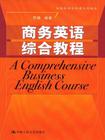商务英语综合教程
2008-11
中国人民大学出版社
邓镝
307
21世纪,中国已真正步人国际化,生存、机遇、挑战和竞争给人们带来了前所未有的危机感。随着世界范围内知识共享和国际商务活动的增多,中国对高层次复合型国际商务英语人才的需求越来越大,也越来越迫切。但是,目前具有广博的国际商务知识并熟练掌握商务英语技能的高级复合型人才为数并不多。大多数人要么只有国际商务的专业知识而没有良好的英语语言技能,要么只具有良好的英语语言技能而没有足够的国际商务方面的专业知识。而缺乏这样的人才,中国的企业很难在国际市场上进行竞争,很难具备真正的国际竞争力。因此,我们必须大刀阔斧地调整我们的教学目的、方法和内容,在较短的时间内为国家培养出高素质、外向型、具有国际视野的复合型国际商务人才。 此类商务人才的成功培养涉及诸多环节与因素,其中至关重要的是要有一套编写意图明确、针对性强、质量高的教材,因为教材是一切教学活动得以开展、教学目标得以实现的基础与前提。由于商务英语涉及面广、专业性强,因而这方面的教材编写难度较大,导致当前的商务英语教材不尽如人意。它们或者局限在专业领域,例如经济、金融、国际贸易等,或者局限于语言领域,只注重英语语言的听、说、读、写,给人以只见树木不见森林的感觉。同时,随着以计算机技术和国际互联网为标志的新技术革命的发展,经贸领域的技术创新层出不穷,新的商务知识和商务语汇亦应运而生,商务英语类教材大多未能及时反映这些变化。直接引进的国外英文教材虽然原汁原味,但大多不符合中国人的语言学习习惯,不利于有针对性地全面提高中国学生的商务英语水平。
第一部分 商务英语阅读与案例 第1章 企业创立篇 第2章 生产运营管理篇 第3章 人力资源管理篇 第4章 营销管理篇 第5章 财务管理篇 第6章 物流管理篇 第7章 风险管理篇 第8章 电子商务篇 第9章 国际贸易篇第二部分 商务英语写作 第1章 标牌 第2章 通知 第3章 商务报告 第4章 便笺与便条 第5章 会议记录 第6章 商务合同 第7章 商务信函 第8章 直观图表一:趋势图(表) 第9章 直观图表二:流程图 第10章 广告 第11章 申请材料第三部分 商务英语口语 第1章 接打电话 第2章 求职面试 第3章 主持会议 第4章 演示与讲解 第5章 商务接待 第6章 商务谈判参考文献
[3] The assets of the firms are on the left-hand side of the balance sheet. Assets representhow a firm has spent its time and money and are usually categorized as either current or fixed.Fixed assets are those that will last a long time, such as a building. Some fixed assets are tangible,such as machinery and equipment. Other fixed assets are intangible, such as patents, trademarks,and the quality of management. The other category of assets, current assets, comprises those thathave short lives, such as inventory or accounts receivable. The products that your firm has madebut has not yet sold are part of its inventory. Unless you have overproduced, the products willeventually be sold. At that time, one asset (inventory) will be converted into another (cash). [4] Before a corporation can invest in an asset, it must obtain funding, which means thatit must raise the money to pay for the investment. Many firms obtain funding from a varietyof different sources. The right-hand side of a firms balance sheet sometimes summarizes theoutstanding different types of financing the firm has used, hence, we often observe a numberof sources rather than just a single provider. A firm will issue (sell) pieces of paper called debt(loan agreements) or equity shares (stock certificates). Debt obligations are owed to creditors,and the stockholders are the debtors. Typically however, shareholders have the right of limitedliability, which means they are not personally responsible for repaying the firms debt obligations.Therefore lenders base their loan decisions on their assessment of the corporations ability (andwillingness) to repay their credit obligations. Similar to our classification of assets as long-lived or short-lived, so too are liabilities. A short-term loan or debt obligation is called a currentliability. Short-term debt represents loans and other obligations that must be repaid within oneyear. Long-term debt is debt that does not have to be repaid within one year. Shareholders equityrepresents the difference between the value of the assets and the debt of the firm. These are theclaims held by the owners of the corporation. In this sense, it is considered a residual claim onthe firms assets. That is, shareholders get paid only after all other financial obligations of the firmhave been satisfied. [5] From the balance-sheet model of the firm, it is easy to see why finance can be thought ofas the study of the following four questions: (l) In what long-lived fixed assets should the firm invest its financial resources? Thisquestion concerns the lefi-hand side of the balance sheet. Of course, the nature of the businessthe firm has chosen to operate in typically determines the type and proportions of assets thefirm needs. We use the terms capital budgeting and capital expenditure to describe the processof committing, investment capital and managing expenditures on long-lived assets. An examplewould be whether Motorola should build a new manufacturing plant to meet the expectedincrease in demand for its cellular phone products.

教材清晰,字迹清楚,印刷不错,值得购买
纸张很好。。。。书不错,速度一般。
不错 上课时候用的。。。。。。。。。。。
适合初级工商学习者
只有最后的场景模拟那两章有点用~
内容不适合初学者,是一本纯理论的书。实际操作性不强